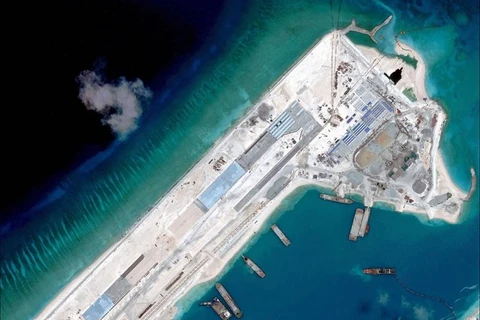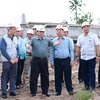 Chinese ship intentionally rams into Vietnamese Coast Guard vessel at the area where China illegally installs Haiyang Shiyou 981 oil rig within Vietnam's continental shelf (Source: VNA)
Chinese ship intentionally rams into Vietnamese Coast Guard vessel at the area where China illegally installs Haiyang Shiyou 981 oil rig within Vietnam's continental shelf (Source: VNA)The Vietnam Embassy in New Zealand and the Centre for Defence and Security Studies under the University of Massey co-organised a talk on the tension in the East Sea in the NZ capital city of Wellington on October 12.
Dr. Nguyen Lan Anh, Deputy Director of the Centre for East Sea Studies from the Diplomatic Academy of Vietnam, was invited to deliver a lecture at the talk.
Anh’s speech focused on main issues such as the historic origin of the issue, updated information and recent images on the happenings, the reasons and effects of the tension in the East Sea, and the prospect of managing and resolving disputes there.
According to Dr. Anh, in the context of the East Sea tension, the parties concerned need to refrain from implementing unilateral policies that change the status quo in the East Sea to ensure the common interests of maintaining peace, stability, security, safety, and freedom of navigation and aviation at the sea.
Such actions as cutting the cables of Viking II, a 3D seismic conducting vessel in June, 2011, and that of Binh Minh II in May, 2011 and November, 2012, illegally capturing Vietnamese fishing boats, unilaterally imposing legal regulations on fishing in Vietnam’s exclusive economic zone (EEZ), illegally anchoring Haiyang Shiyou 981 oil-drilling rig deep into Vietnam’s EEZ and continental shelf in May 2014, and the large-scale construction of artificial facilities in disputed areas in the East Sea not only violated international law but also escalated suspicion and complicated the situation, probably even leading to conflict, said Anh.
It is necessary to obey international law and the 1982 United Nations Convention on the Law of the Sea ( UNCLOS ), fully execute the Declaration on the Conduct of Parties in the East Sea (DOC), promote practical negotiations of a Code of Conduct in the East Sea (COC ) and cooperation at forums and in existing multilateral mechanisms in which ASEAN plays a central role such as ARF, ADMM, ADMM+, EAS, and clarify claims in the East Sea if they are compatible with international law, Anh said.
The talk brought together 100 university professors, lecturers, and students, diplomats, ministry officials, and reporters in Wellington.-VNA























